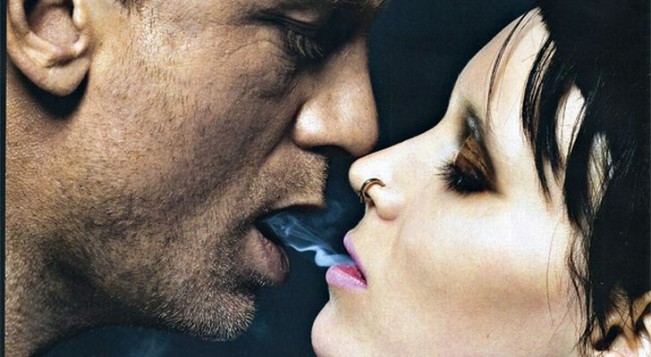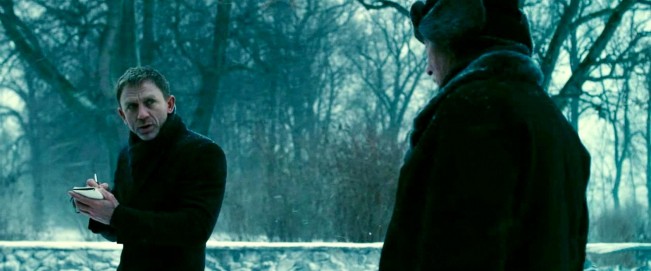

By Mike Wilmington Wilmington@moviecitynews.com
Wilmington on Movies: The Girl with the Dragon Tattoo (Fincher)
The Girl with the Dragon Tattoo (Three and a Half Stars)
U.S.: David Fincher, 2011
Rooney Mara is no Noomi Rapace. At least when it comes to playing superpunk, black-jacketed, neo-noir heroines with burning eyes, pierced eyelids and absolutely deadly temperaments.
But she’s close.
In David Fincher‘s remake of the Swedish thriller sensation, The Girl With the Dragon Tattoo, the tart-tongued American actress (Mara) who put down Jesse Eisenberg so effectively in the opening scenes of The Social Network, does prove surprisingly adept, and very entertaining, at following Noomi’s lead: at putting down (and messing up) chauvinist pigs, and uncovering serial killers in Noomi‘s old role of supreme hacker/heroine Lisbeth Salander.
The new Tattoo is a very effective Hollywood movie thriller as well, even if it’s one that — at least for Dragon Tattoo veterans — has few surprises. Director Fincher (Se7en) and screenwriter Steven Zaillian (Schindler’s List) stay so remarkably faithful (so far) to the plot, characters and parameters of the original novel and hit Swedish movie, that a sense of neo-noir déjà vu permeates the whole show.
Lisbeth of course was the astonishingly anti-social but utterly compelling heroine of the movies made from the late Swedish journalist/novelist Stieg Larsson‘s world wide bestsellers, the trio that made up The Millennium Trilogy: She was the “Girl” in The Girl with the Dragon Tattoo, The Girl Who Played with Fire, and The Girl Who Kicked the Hornet’s Nest. Those Millennium novels, all published posthumously, followed the dangerous investigations of the fictional Swedish leftie journalist, Mikael Blomkvist (a character many feel was modeled on leftie journalist Larsson himself), into the mysterious disappearance, 40 years earlier, of Harriet Vanger, beloved great-niece of Mikael’s employer, Henrik Vanger.
Henrik is a strange bedfellow, or employer, for Mikael. He’s the elderly but still determined patriarch of a famous Swedish corporate family, an elite clan who prove to have numerous skeletons (besides possibly Harriet’s) rattling around in their mansion closets. Complications abound, and so does a sense of tabloid semi-reality. Mikael (played in the original Swedish films by Michael Nyqvist), was hired by Vanger (and ensconced in a cottage on the Vanger private estate-island) to solve the Harriet mystery after losing (wrongly) a huge libel case filed by the corrupt business magnate, Wennerstrom, against Mikael‘s magazine, Millennium. And Mikael, in turn, hires the unorthodox Lisbeth as his researcher, because of her incredible skills at digging facts out of the Internet — and because he isn’t put off by her fashion statements.
Soon the two of them are swimming in a whirlpool of family secrets, scandal, and spiralling dread — a multi-plotted terror trap that the late Larsson kept up though all of the three Larsson novels as they became phenomenal bestsellers, and then became three world wide smash hit Swedish movies, and now have begun their latest career as presumed American film blockbusters.
They’re wildly popular, but are they good? A handful of critics and commentators have complained that Fincher and his screenwriter Zaillian, haven’t changed the story enough, this time around. But it should be obvious by now that most of the vast world audiences for these stories don‘t want them changed, and that number definitely includes most of the people who’ve already read the books or seen the Swedish movies. Hewing to the original as much as possible: That was super-producer David O. Selznick’s rule on adapting beloved bestsellers and classics to the screen — from “David Copperfield” to “Gone with the Wind” to “Rebecca.” And Selznick was usually proven right.
More important than originality debates about the new Dragon Tattoo though, are the facts that it’s been smartly and deftly adapted, extremely well cast and beautifully and excitingly filmed — that it has serious themes and engaging characters and an intricately assembled and finely crafted plot, as well as a strong social/political dimension, and a pulpily lurid grabber of a storyline. Overall, it’s the sort of intelligent adult entertainment we keep asking for and don’t usually get from our blockbuster movies, but that both Dragon Tattoo and the recent John le Carre novel adaptation, Tinker Tailor Soldier Spy try to give us.
Adding greatly to that intelligence, and to that entertainment value, is the new film’s excellent cast: Rooney Mara as Lisbeth; Daniel Craig as Mikael; Robin Wright as Mikael’s editor-lover Erika (Lena Endre in the original), the very active octogenarian Christopher Plummer as Mikael’s new employer, Henrik Vanger, the always superb Stellan Skarsgard as genial Vanger company head Martin, Joely Richardson and Geraldine James as Vanger family members Anita and Cecilia, Steven Berkoff as the dour family attorney Dirch Frode, and Yorick Van Wageningen, as Bjurman, Lisbeth‘s amoral legal nemesis and subject of the trilogy’s most shocking and notorious scenes: the rape and anti-rape.
Mara has the hardest task: reprising a very popular role in which the original actress — Noomi Rapace, with her semi-goth outfits, spiky hairdo, “screw you” attitude and killer stare — has already made into something fantastic and richly memorable. When we think of Lisbeth by now, we probably think of Noomi, and of the way she was dressed and made-up in the original movie directed by Niels Arden Oplev.
Noomi was one of the major reasons the Swedish films were so successful and so well-regarded; and it’s obvious that Rooney has modeled a lot of her own interpretation on her sexy, scary predecessor. In Fincher’s movie, Rooney is dressed and made up much the same, with a similar dead white face and black punk getup. It’s also obvious that, good as Rooney is here, she falls short of the original, perhaps merely because she isn’t the original, so she can’t possibly surprise and gratify us as much — though that probably won’t much bother anyone who hasn’t seen Ms. Rapace‘s turn, nor in fact, most of the ones who have.
A bit more shy of the mark, I think, is Daniel Craig, the stalwart James Bondsman, who gives a very good performance by any normal definitions, but misses one key aspect. He doesn’t look or seem as vulnerable as his Swedish counterpart Nyqvist — or as, say, Leo DiCaprio or Colin Firth or Daniel Day-Lewis or Matt Damon or even George Clooney might have made him. Craig is one of those actors who sometimes looks as if he can take down the world or wouldn’t be averse to trying, and I never really worried all that much about his Mikael being able to handle himself in any kind of crisis, however physical — even the horrendous fix he gets into eventually at the hands of this movie’s killer.
That’s something Craig and the others might think about in the upcoming sequels, where Mikael will face a lot more palpable or implied menace, and where, as here, it’s a major point of the story that he can’t quite cope with the threat, that he needs some of Lisbeth’s killer streak to be able to survive.
On the other hand, it’d be hard to top either Plummer, Skarsgard, Van Wageningen or Berkoff in their juicy archetypal thriller roles, despite the memory of the very talented Swedish cast and their performances — especially all the irony and bottled rage and despair Sven-Bertil Taube put into the Swedish Henrik.
This isn’t the first serial killer thriller Fincher has tackled — he had an audience hit with the horrific Se7en (1995) and a critical favorite with the fact-based Zodiac (2007) — and here, he‘s somewhere between the two. In terms of technique and storytelling though, he’s at his best. The images, thanks to production designer Donald Graham Burt and cinematographer Jeff Cronenweth, are chilly and mesmerizing; the convoluted plot unfolds with deadly clarity. Fincher is great at creating moods of nightmare and mounting dread, and that’s what Larsson’s plots require — though I still enjoyed Oplev‘s Swedish version a little more, because it was the first time around, and that’s when mysteries work best.
So why do murder mysteries and detective yarns, film noirs and neo-noirs, still captivate audiences — and usually the smarter audiences — so much and so intensely? Perhaps it’s because most of us enjoy unraveling puzzles and identifying with the sleuths who can unravel them — and because the best of these stories imply that the world in all its mysterious tangles, can be fathomed, and that justice, in all its vagaries, is not as fragile as it sometimes seems, and that the confusion and chaos and horrors of life may sometimes, somehow, be finally straightened out, or at least understood.
That’s the appeal of The Girl With the Dragon Tattoo in all its forms: as an addictive “good-read” novel, as an arty foreign film, and, now, as a Hollywood blockbuster. It’s a movie that works for lots of people and that doesn’t really need Noomi to survive — even though it’s nice to know that she’s still around, and that Lisbeth has still got her tattoo.
















I just saw the movie. Maybe 3 stars. Many reviews say the adaptation is accurate. Could you please tell me what happened to Anita in Australia? Did read the wrong book?
Personally, I would have preferred to see the Swedish Blomkvist reprise his role in the Hollywood adaptation as I didn’t really buy Craig’s performance (perhaps because I think of him as Bond?), but Rooney Mara was ASTOUNDING. I don’t wish to take anything away from Noomi Rapace (who was arguably very good), but Mara brought a vulnerability and ferocity to the role that was lacking with Rapace’s interpretation of Lisbeth Salander. If she doesn’t get the Golden Globe and at least an Oscar nomination, I will be very disappointed. I kid you not, she BLEW ME AWAY with her performance. I intend to see the film for a second time and will be one of the first to buy it when it comes out on DVD.
Tom: The US version totally changed the Anita/Harriet ending.In this version, Anita IS Harriet, which is not how the book goes at all. The Swedish version has Anita’s phone being tapped, leading them TO Harriet in Australia. If I remember the book correctly, Lisbeth just finds out in some documents that two Anita’s left the country, and they track her down in Australia that way. It’s been a while since I read the book, so I may be off, but the US film changed it, for some reason.